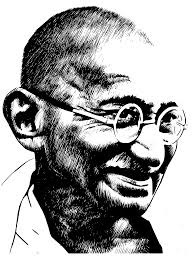The irrelevance of Mahatma Gandhi in Modi's India
Gandhi, also called the Father of the Nation was the first casualty of Hindu nationalism in India. Today he is the subject of mockery and disdain for a country reveling in right wing nationalism.
Earlier this year, on the 154th birthday of Mohandas Gandhi, a national
holiday in India, three of the top ten Twitter trends in the country celebrated
Nathuram Godse, the Hindu fundamentalist who assassinated Gandhi.
The month before, at one of the biggest Hindu festivals in India, the Ganeshotsava,
posters of Godse were displayed along with those of Hindu deities in the state
neighboring Gandhi’s birthplace of Gujarat. This would be akin to carrying posters of
John Wilkes Booth at a President’s Day parade.
Seventy-five years after his assassination, Gandhi, the man who led India out of
British rule, revered in the west as the exemplar of nonviolent protest -- has become
a casualty of India’s lurch toward Hindu nationalism. The Mahatma is now reviled by
Hindu nationalists for failing to establish a Hindu government in India when he had
the chance. Instead, Gandhi advocated Hindu-Muslim unity in one secular state,
India, the world’s largest Democracy.
On Facebook, Twitter, Instagram and YouTube, Godse, the assassin, has a newfound
fanbase that portrays him as a hero. Executed by hanging in 1949, he had tried to kill
Gandhi twice before he succeeded: once with a knife, once with a dagger. In both
cases, Gandhi declined to press charges, so the young man was released despite
openly threatening the leader. The third time he used a gun. He blamed
[outlookindia.com]Gandhi for the loss of Pakistan during partition (although Gandhi
opposed partition), felt Gandhi was pro-Muslim and feared that Hindus would
continue to lose ground if Gandhi remained as an influence on the government.
Godse was a member of the Hindu nationalist paramilitary organization Rashtriya
Swayamsevak Sangh (RSS), which is the ideological fountainhead of Prime Minister
Narendra Modi’s Bharatiya Janata Party (BJP). And since Modi was first elected in
2014, the narrative blaming Gandhi has taken hold.
On Colaba, a bustling, touristy street in Mumbai, a seller of memorabilia across from
the Taj Mahal Palace hotel was not impressed when I picked a bronze souvenir
depicting Gandhi on the 1930 Dandi March, protesting Britain’s tax on salt. He said
the only people who buy things like that are “white foreigners.”
The merchant, who hails from Gujarat, did not wish to be named but told me that a
new generation of Indians has a different opinion of the man referred to as “the
father of the nation.” . He tells me that Gandhi partitioned India to appease
Muslims and appear as a humanist to the world to be labelled a
‘Mahatma’. “The world loves to put pseudo secularists like him on a
pedestal but we are now aware of his reality”
This school of thought is not an aberration. Modi has referenced Guruji Golwalkar,
who led the RSS at the time of the assassination, as a major inspiration
[caravanmagazine.in]. It was Golwalkar who had stated [thewire.in] at a rally of the
Hindu right wing on December 7 1947 that “Mahatma Gandhi wanted to keep the
Muslims in India so that the Congress [party] may profit by their votes at the time of
election . . . We have the means whereby such men can be immediately silenced, but
it is our tradition not to be inimical to Hindus. If we are compelled, we will have to
resort to that course too.” A month later, Gandhi was killed.
At the Sabarmati Ashram in Gujarat, one of the homes of the Mahatma, I
encountered teenagers posing for selfies and picnicking on the lawn. When I asked
questions about Gandhi, they seemed uninterested, one says, he is the man
whose face is on the Indian rupee.
Another college student mocks Gandhi, writing him off as merely the grandfather of
‘pappu’ (a derogatory term coined for Indian opposition leader Rahul Gandhi, who is
not in fact related to the Mahatma).
Gandhi has never been this unpopular. The 1982 Richard Attenborough biopic about
him won eight Academy Awards and introduced a new generation to the Indian
independence fighter.
Keep reading with a 7-day free trial
Subscribe to Rana Ayyub's Newsletter to keep reading this post and get 7 days of free access to the full post archives.




